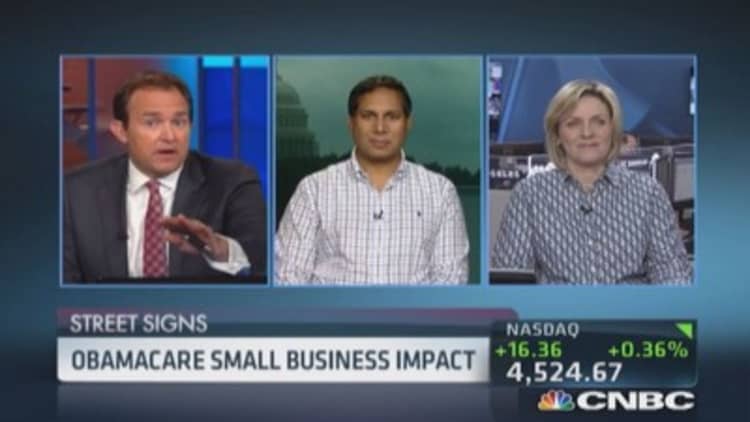Obamacare's "Cadillac tax" doesn't kick in until 2018, but that isn't stopping companies from worrying about it now—and taking steps to avoid it later.
Nearly 3 out of 4 companies polled in a new survey by employee benefits consulting firm Towers Watson said they're either "somewhat" or "very" concerned they will get whacked with that hefty tax targeted at high-cost health plans, either because of what those plans already cost or where they are headed.
Forty-three percent of those mid- and large-sized companies said that avoiding the Cadillac tax is "the top" priority for their health-care strategy in 2015, according to the survey.
That concern is accelerating an already strong trend toward having workers foot a greater share of their overall health-care costs in the forms of higher deductibles, copayments and coinsurance charges—whose dollar amounts are not factored in when calculating the tax.
More companies are also considering other cost-saving measures, such as encouraging use of telemedicine services and giving employees incentives to go to certain medical providers.
Read MoreObamacare 'widely' boosting health costs
"Plan design is definitely being influenced" by Cadillac concerns, said Randall Abbott, a senior consultant at Towers Watson. He added the companies that aren't worried about the Cadillac tax should be.
While 61 percent of large employers questioned by the same firm in another survey said they expected to be liable for the tax, the actual number that will be affected is way higher.
"Based on the definition today, and based on the trajectory most employers are on, sooner or later everybody is going to pay," Abbott said. "It can be avoided, but it requires effort."
Beginning in 2018, companies will have to pay Uncle Sam an excise tax of 40 percent on every dollar spent annually on health plan premiums in excess of $10,200 for individuals and $27,500 for families.
The premiums paid by the employer and the employee are lumped together for the tax's calculation. And the tax is indexed to roughly the general rate of inflation—which Abbott noted is worrisome because health-care costs for years have easily outpaced the overall consumer price index.
Companies polled by Towers Watson said they expect their health-care costs for active employees to rise by an average of 4 percent in 2015 if they make changes to the design of their plans. Without making such changes, those costs are expected to rise an average of 5.2 percent.
The latest reading of the consumer price index, by contrast, shows that for urban consumers, prices of items increased by 2 percent over the past 12 months before seasonal adjustments, according to the U.S. Bureau of Labor Statistics.
Read More'Please delete this email': Obamacare memory hole
Several industry sectors—energy, utilities and pharmaceuticals—are seen as particularly vulnerable to the Cadillac tax because their health plans tend to be much pricier than the average health costs for all companies. The benefit advisory firm Mercer, a unit of Marsh & McLennan, estimates that about 40 percent of large employers would be subject to the Cadillac tax if it were in effect now.
However, "Everybody's going to get hit, sooner or later, if they don't take some action," Abbott said. "The new gold standard is managing to CPI. If you can get your cost trend down to the CPI, you may be able to avoid the excise tax."
The tax will partially offset the subsidies that the federal government is paying for people who enroll in Obamacare health insurance plans currently being sold through government-run exchanges.

In 2018, the Cadillac tax is projected to bring in $5 billion to the government. That amount is expected to double in 2019, and increase in years thereafter to as high as $30 billion in taxes by 2024, according to the Congressional Budget Office.
The tax is nondeductible for employers—which means that companies will either eat the cost themselves, or offset some of it on to their workers, Abbott said.
"That's why employers are concerned," Abbott said. "And the implications are profound."
One strategy for avoiding the the tax was reflected in another finding of the Towers Watson survey.
While just 10 percent of the companies said that in 2015 they intend to adopt the idea of giving employees financial incentives for reaching certain health outcomes—such as losing weight or lowering their cholesterol levels—almost half of the companies are considering adopting such incentives in 2016 and 2017, right before the tax kicks in.
"The goal is to try to improve the health status of the individual and to reduce chronic conditions," Abbott said.
Read MoreWatch out retailers: Wal-Mart health-care hit
If the overall health of a company's workforce improves, it can control plan premium costs, which in turn can lower exposure to the Cadillac tax, he said.
To control their costs, 81 percent of the companies surveyed plan to make some kind of changes to their health benefit plans in coming years, a 9 percent increase over last year's survey results.
A third of the companies said they are considering significantly cutting how much they subsidize the health benefits of spouses or dependents of workers.
—By CNBC's Dan Mangan


